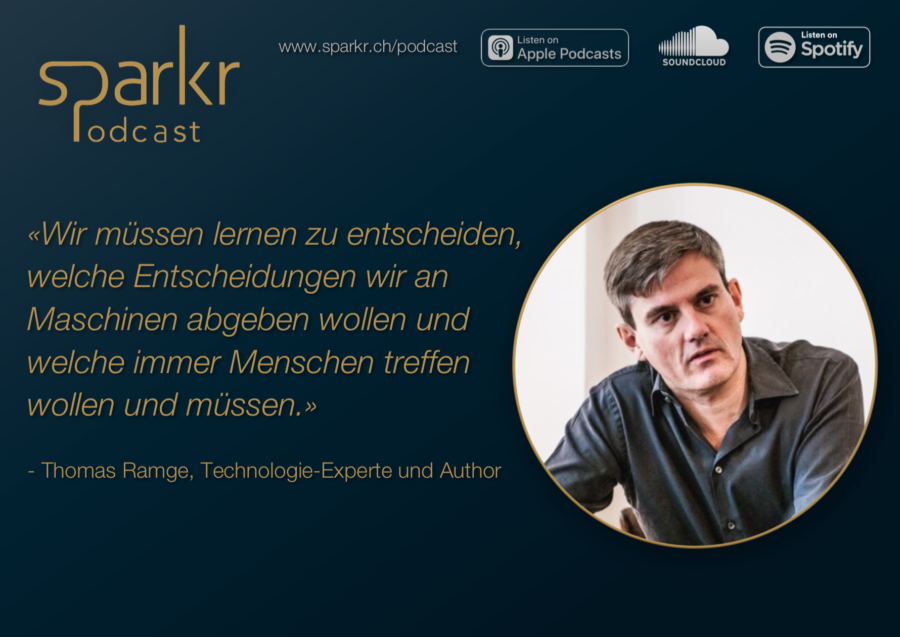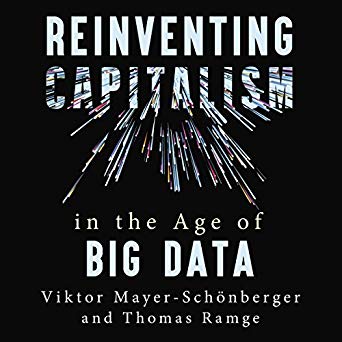For years it’s been advocated that developments in artificial intelligence, machine learning, big data and more will fundamentally change our economy and society.
Few people in the German speaking world have been dealing with all facets of these technological changes and their impact on business and society with such a thoughtfulness as Thomas Ramge. Thomas is an acclaimed journalist and author of books such as «Reinventing Capitalism in the Age of Big Data».
Folgen von Künstlicher Intelligenz Thomas Ramge
Artificial Intelligence
I had the pleasure to sit down with Thomas during a conference at the Gottlieb Duttweiler Institute and discuss those changes and their consequences for society in a rather philosophical manner but still we came up with some practical insights for businesses and decision makers responsible for shaping regulatory and other frameworks in the face of the digital transformation.
We touched the basics of the technologies shaping the future – namely AI, machine learning and big data – and then focused on their influence on how we will make decisions in the future, which decisions should be made by machines rather than humans, how companies should adjust their organizational structures and what concrete regulatory measures can prevent harmful monopolistic capitalism.
Folgen von Künstlicher Intelligenz

Folgen von Künstlicher Intelligenz
Below I summarize some thoughts from the conversation Thomas and I had for the Sparkr Podcast. For everyone who wants to go deep I recommend listening to our podcast or get a copy of Thomas’ books «Reinventing Capitalism in the Age of Big Data» or «Who’s Afraid of AI?: Fear and Promise in the Age of Thinking Machines». You find them as physical books in all your favorite book stores or as audiobooks wherever you get your food for thought.
The following list is a collection of some of the interesting reflexions from this episode of the Sparkr Podcast and Thomas’ books:
- With ever better machine learning and big data we can delegate decision making to machines in ever more domains.
- As individuals and as society we must learn and decide which decisions should be made by humans and which ones by machines.
- Our decisions should make us happy. Keep in mind that machines don’t need to be happy with their decisions.
- It’s easier to change variables in a decision-making-machine than changing stereotypes or world views among humans and in human systems such as companies or justice systems.
- In a sense, companies and other organizations are a form of artificial intelligence similar to the neural networks of machines because in large organizations as well as in neural networks many different variables are doing their magic in an intransparent way and come up with a result.
- We don’t know how a machine learning system comes up with its decisions but neither do we know how humans or human systems come up with their decisions (think of human intuition, intransparent decision making processes in large corporations etc).
- Promises of the superiority of machine made decisions must not be believed without strong empirical proof.
- The same applies for human decisions.
- The most successful companies are data driven and have decentralized decision-making-processes.
- The most successful companies organize and provide platforms or marketplaces.
- We might think that we live in highly innovative times but this is not the case. We are currently moving towards a monopolistic capitalism in which data as the most important resource for future innovation and healthy competition is held by a small number of super star firms.
- For markets to work well in the future, these monopolistic tendencies must be weakened by regulation by the state.
- A regulatory innovation could be a progressive data sharing imperative saying that companies must share some of their data proportionally to their market share or dominance. That way, other competitors with bright ideas have a fair chance to disrupt the incumbents.
Künstliche Intelligenz KI
More Episodes of the Sparkr Podcast
You find all the Sparkr Podcast Episodes here and you can subscribe to the podcast on Apple Podcast, Spotify, Soundcloud or wherever you listen to your favorite shows.
#23 Wolfgang Beltracchi über Kunst, NFTs und einen 450 Millionen Dollar Fake (German)
#22 Batterien - Schlüsseltechnologie für die Nachhaltigkeitsrevolution (German)
#21 Frugal Innovation - a powerful mindset for a better economy (English)
#20 Innovation in der Verwaltung - Hinter den Kulissen des Corona Rettungsprogramms (German)
#18 Self-management methods and productivity tips for less stress (English)
#17 Sustainability - Insights from a fascinating researcher and social entrepreneur (English)
#15 Resilienz und Widerstandskraft stärken mit Erkenntnissen aus der Stressforschung (text: English, audio: German)
#14 The Future of Work and Open Innovation - a Conversation with Stanford Professor Pamela Hinds (English)
#12 Künstliche Intelligenz und die Folgen für Mensch, Gesellschaft und Wirtschaft mit Thomas Ramge (text: English, audio: German)
#11 Jean-Claude Biver über wahren Erfolg, echten Luxus und was wir von Hippies lernen können (German)
#10 Executive Briefing on 5G (English)
#3 Lukas Peter from Swisscom about what (Swiss) SME can learn from Silicon Valley (text: English, audio: German)
#2 Timo Pelz from Facebook about the importance of corporate culture (English)
#1 Ottmar Hitzfeld about leadership (German)





13 Gedanken zu “Künstliche Intelligenz & die Folgen für Mensch, Gesellschaft & Wirtschaft (Sparkr Podcast #12)”
Die Kommentare sind geschlossen.